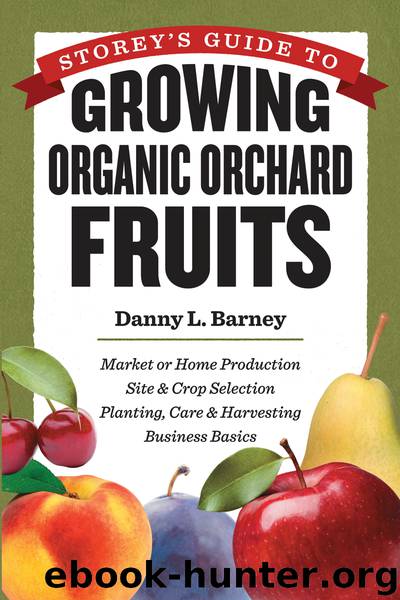Storey's Guide to Growing Organic Orchard Fruits by Danny L. Barney

Author:Danny L. Barney
Language: eng
Format: epub
Tags: orchard, marketing, market, fruit, orchard fruits, organic fruit, organic orchard fruit, cultivars, organic standards, organic certification, pruning, harvesting, fruits to market, farming business
Publisher: Storey Publishing, LLC
Published: 2013-02-25T05:00:00+00:00
Cottonseed meal. Cottonseed meal is the dry matter left after cotton has been ginned and the oil extracted from the seeds. This high-protein product is often used for animal feed in the southern and western United States and is used as an organic fertilizer. It provides 6 to 9 percent of slow- to moderately rapid–release nitrogen and lesser amounts of phosphorus and potassium. If you have access to a cost-effective source of this product, it can be a good orchard amendment. Ensure that any product you use has been tested for pesticide residues and you have documentation that it is free from such contamination.
Dolomite. Dolomite (also known as dolomitic limestone) is primarily mined from sedimentary deposits and consists largely of calcium magnesium carbonate (CaMg(CO3)2). Its primary use in horticulture is to raise soil pH levels while supplying magnesium. Because this is a natural product, the percentages and chemical compositions of calcium and magnesium vary, as does its calcium carbonate equivalent value (liming ability). As we discussed in chapter 4, do not apply dolomite unless soil magnesium concentrations and pH are both low. Excessive amounts of magnesium can interfere with calcium uptake and increase bitter pit problems in apples.
Enzymes. Various organic products containing enzymes, often combined with supposedly beneficial microbes and plant nutrients, are marketed as fertilizers and soil amendments. According to the U.S. National Organic Program, enzymes are acceptable if derived microbiologically from natural materials and not fortified with synthetic plant nutrients. In actual practice, it is extremely difficult to understand how applying enzymes to the soil would benefit orchard crops.
Enzymes are chemically complex biochemicals that carry out or regulate very specific chemical reactions. Microbes, soil macroorganisms, plants, and all other living things produce the enzymes they need for their life processes. While adding enzymes to the soil or spraying them on your fruit crops is not likely to cause any damage, you will earn much greater returns on your investments of time and money by focusing on creating the conditions needed for a biologically rich and active soil containing adequate amounts of plant nutrients. We have covered many such practices, such as correcting soil drainage problems, adjusting soil pH, incorporating green manure crops, applying compost, and adding optimal amounts of plant nutrients.
Download
This site does not store any files on its server. We only index and link to content provided by other sites. Please contact the content providers to delete copyright contents if any and email us, we'll remove relevant links or contents immediately.
Turbulence by E. J. Noyes(8014)
The Thirst by Nesbo Jo(6921)
Gerald's Game by Stephen King(4633)
Be in a Treehouse by Pete Nelson(4029)
Marijuana Grower's Handbook by Ed Rosenthal(3668)
The Sprouting Book by Ann Wigmore(3580)
The Red Files by Lee Winter(3409)
The Remains of the Day by Kazuo Ishiguro(3388)
Sharp Objects: A Novel by Gillian Flynn(3003)
Organic Mushroom Farming and Mycoremediation by Tradd Cotter(2684)
Christian (The Protectors Book 1) by L. Ann Marie(2678)
The Culinary Herbal by Susan Belsinger(2470)
Stone Building by Kevin Gardner(2386)
The Starter Garden Handbook by Alice Mary Alvrez(2329)
Lilac Girls by Martha Hall Kelly(2288)
The Unlikely Pilgrimage of Harold Fry by Rachel Joyce(2260)
The Lean Farm Guide to Growing Vegetables: More In-Depth Lean Techniques for Efficient Organic Production by Ben Hartman(2123)
Urban Farming by Thomas Fox(2099)
Backyard Woodland by Josh VanBrakle(1921)
